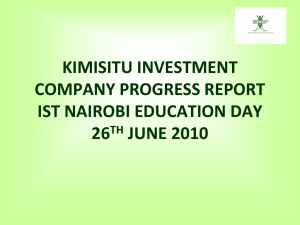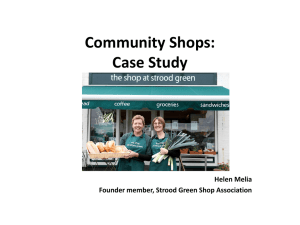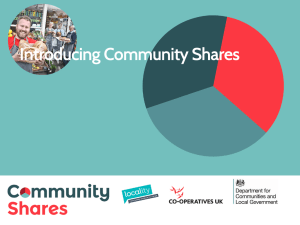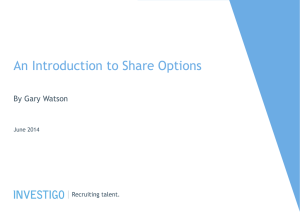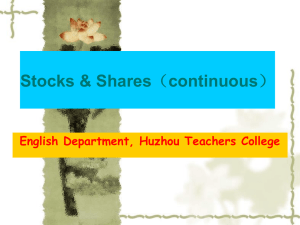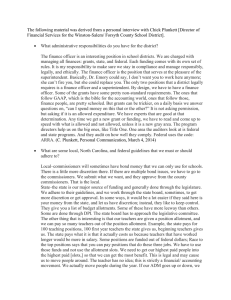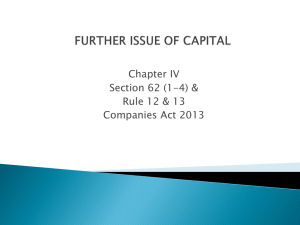Community Shares INTRO - Co
advertisement
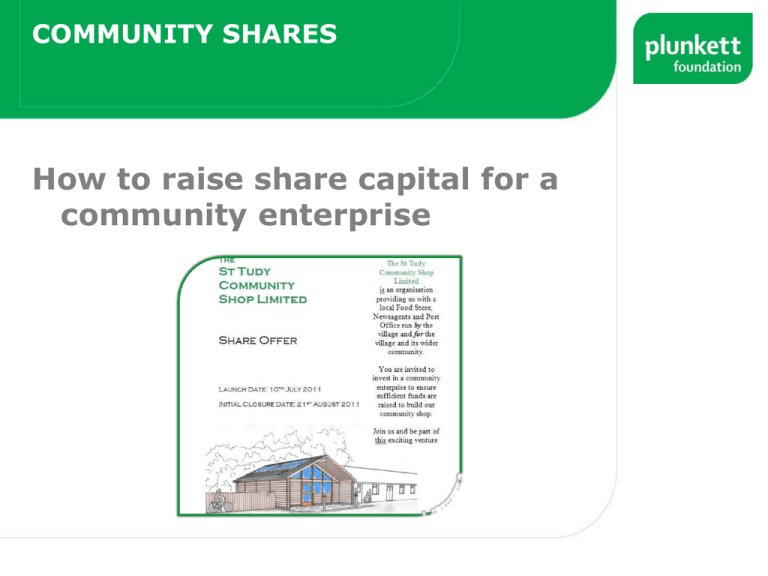
COMMUNITY SHARES How to raise share capital for a community enterprise Legal structures Several different structures used by community shops: • Company limited by guarantee • Community Interest Company (CIC) • Bona fide cooperative (IPS) • Community Benefit Society (IPS) (IPS = Industrial & Provident Society) • Plunkett is a sponsoring body for IPS Community Benefit Society rules. • Over 60% of community shops use this structure. Plunkett model rules for Community Benefit Society Plunkett Model Rules: • Provide a template • Bespoke for the needs of community enterprises • Democratic principles: one member, one vote • Allow for community shares • Profits reinvested in the enterprise or allocated for community purpose • Approved by FCA (Financial Conduct Authority) • Registered with Companies House/DETI in NI • Compliant with up-to-date legislation • Include automatic updates The Plunkett model Why does Plunkett favour the Community Benefit Society? • Shareholder democracy (one member, one vote) • Withdrawable share capital (“community shares”) - works in situations where ordinary transferable shares wouldn’t • Limits on shareholdings (£20k per individual) • Limit on share interest (should only be paid at a rate necessary to raise enough capital to run the business) • Distribution of profits to community • Open membership (not even any age limit) • Asset lock (on dissolution, the assets must go to another similar community or charitable enterprise) What are “community shares”? Unique to IPS structure. They differ from company shares. • Withdrawable only from the business itself • Cannot increase in value • Non-transferable • Interest payable • Can raise significant funds in small amounts from large numbers of shareholders • Max £20k investment per individual (currently) • Eligible for tax relief (Enterprise Investment Scheme – EIS) Only one vote, no matter if shareholding is £1 or £20,000 How to present the idea to a community • Different economic model – needs explaining • Be realistic about how much needs to be raised • Emphasise the “social return” • Tax relief is a great draw-card • Emphasise limited liability • A good prospectus can make a great difference – make it look professional • Keep it simple - the detail should be in a Business Plan • Distribute as widely as possible – there is strength in numbers! Frequently Asked Questions If someone was asking you to buy shares, what questions would YOU ask before investing? • • • • • • • • Who are the people organising this? Do they have a personal interest? Is it a good business proposition? Who will run it? Is there a business plan? What is my liability should I invest? Will my investment increase in value? How can I get my money back if and when I need it? What redress do I have if the business fails? The key to success Community share offers are successful • Investors become your customers/volunteers/champions • Share investment gives a VOTE and a voice • The project becomes a shared venture • People can invest as much or as little as they can afford • They attract good publicity • Share investment can be used as leverage – attracts investment from lenders and grant-givers Return on investment Interest can be paid on shares although few community shops offer this (pubs do) Proposed by committee, after assessing business health Cap on interest in rules (to keep it prudent) Another financial benefit: EIS/SEIS (Enterprise Investment Scheme) – government tax incentive scheme to encourage investment in new enterprise – and Seed EIS for the smaller enterprises Tax relief on community shares of 30% (EIS) or 50% (SEIS) Not just a financial investment Having a substantial group of members behind you - moves the project on from being an IDEA to being a PROPOSITION - Gives other investors confidence - Improves the likelihood of lasting success - Improves social cohesion - Volunteering is a sign of a healthy society Aim to include a large proportion of households in the project RESULTS! Recent community share offers THE LARGE ONES: • Dunsfold, Surrey raised £208,000 in community shares to buy village shop and flat above. • Hinton St George, Somerset raised £140,000 to buy their shop & flat. • Neatishead in Norfolk raised £55,000 to purchase a shop to serve three villages. • Ide, Devon raised £70,000 to convert an old garage to a shop/cafe. • Wrabness, Essex (pop. 400) raised £100,000 to purchase & convert a bungalow into a village shop and licensed cafe. Latest: COMMUNITY SHARES FOR PUBS Following the community shop model, cooperative pubs are regularly raising amounts in excess of £100,000. The Bell Inn in Bath raised a whopping £810,000 in shares RESULTS! Small can be beautiful SMALLER AMOUNTS - SAME ACHIEVEMENT • • • • Hurst Green, East Sussex (area of deprivation) raised £22,000 to renovate unused church for a community hub Buckland Brewer, North Devon raised £4000 to help towards converting their church vestry into a shop Aston on Clun, Shropshire raised £6000 towards the purchase of a portacabin shop Chiddingly, East Sussex raised £4500 to convert a farm building into a tiny shop And an urban pub project: • The Bevy pub, Brighton (area of deprivation, first coop pub on a housing estate) raised £44,250 from 546 shareholders Contact… The Plunkett Foundation Woodstock info@plunkett.co.uk 01993 810730


